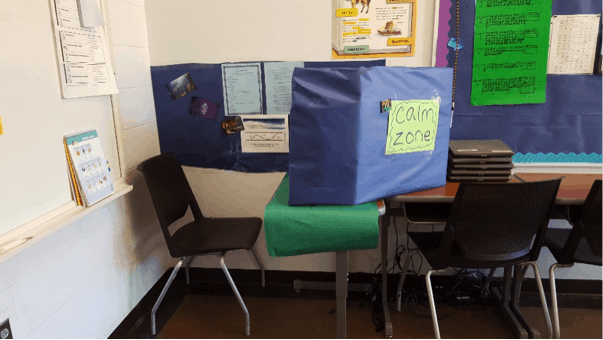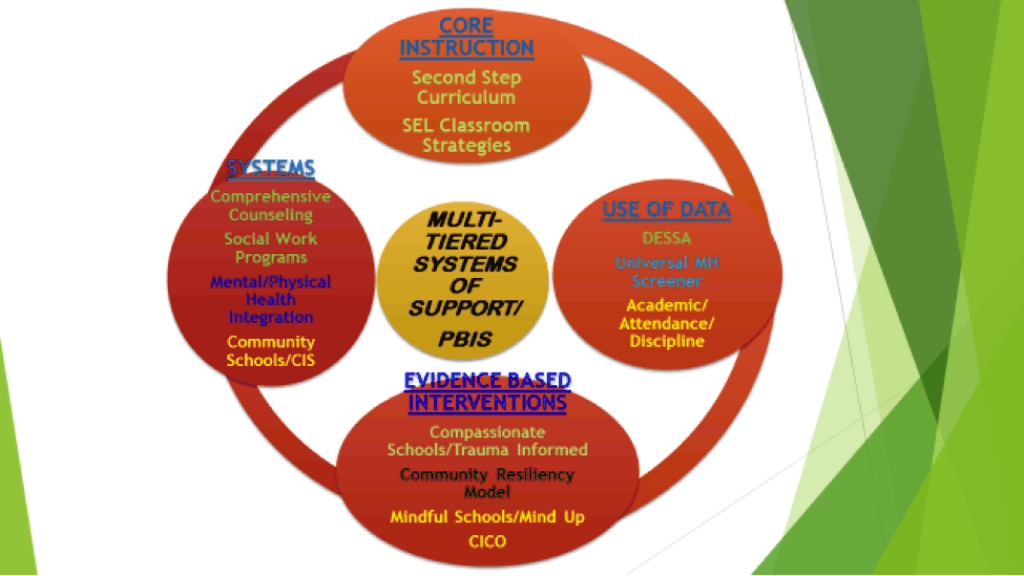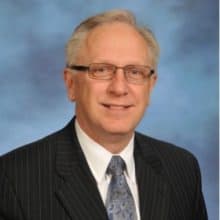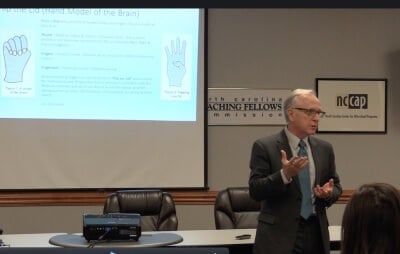

Two and a half years into implementing Compassionate Schools in the Buncombe County district, we are still refining the integration of support and services into a multi-tiered system that makes the paradigm shift to trauma/chronic stress informed strategies meaningful and sustainable. The program is modeled after Washington State’s “The Heart of Learning and Teaching.”
We have had many successes along the way, and we are amazed with how easily elementary students learn the language of emotional regulation. Students now understand what is happening in their brain chemistry as they encounter stressors. They also realize their responses are biological and normal, and they understand there are actions they can take to regulate them. It is not uncommon to hear students remind other students, “it looks like you are flipping your lid,” or “do you need some time?”
It is also not uncommon in many of our schools to see mindfulness activities used with all students to reengage the brain in learning and concentration. Through a contract with Asheville Mindful Living, multiple schools are being trained in the Mindful Schools model. This integration of mindful practices for staff and students creates an awareness of what our bodies are sensing and responding to and allows participants to have the space and time to create a solution and experience a more positive outcome. Students with particular anxiety issues find they are able to reduce negative responses to certain factors, such as testing, peer interactions, or aggressive impulses, by taking a few moments to breathe deeply and focus on the body and sensations.
So what does this look like in a multi-tiered system? First we must begin with a “Compelling Why”. What makes this model so unique is not just the interventions and supports educators use to interact with students or the structures and systems where they reside, but in the defining differences rooted in what we believe about teaching the Whole Child, the impact of trauma and stress on the brain and how that impacts both behavior and academic achievement. We recently developed the following belief statement to talk with school district staff, teachers, and the community.
We believe:
- Trauma and stress changes brain chemistry and impacts student learning.
- Social emotional learning improves student behavior and academic achievement.
- We must provide interventions that regulates brain functioning to improve student attention to instruction and social-emotional behavior.
- Personalized instruction includes providing supports and interventions to all students, at the right time, and at the right intensity.
The other components of our structure include the “what:” the framework that will make the make the most significant connection between social emotional behavior and academic achievement. In our district, this is MTSS, Multi-tiered Systems of Support. Buncombe County Schools has implemented Positive Behavior Supports and Intervention for seven or eight years. We are using the tiered model and team problem-solving process at all 43 schools at some level of implementation.
We believe that the MTSS structure allows us to recognize that students’ emotions and behavior cannot be separated from their ability to learn:


So what have we achieved in this process?
- After one year of implementation, four out of six elementary schools who exceeded academic growth expectations on the EOG participated in Compassionate Schools (Emma, Fairview, Johnston & Oakley).
- Office referrals declined at a greater rate for Compassionate Schools compared to district averages.
- The Devereux Social Skills Assessment data that is correlated with our Second Step curriculum lessons indicated that schools are significantly improving K-5 students’ social skills as rated by teachers from beginning to the end of the school year.
- Fifteen counselors and social workers have become trainers in the Community Resiliency Model, based upon brain science that provide activities to reengage the brain through sensory strategies. As a result, 720 school staff, school resource officers, and teachers beginning the profession have been trained in how stress and trauma can affect the classroom.
- In addition, Buncombe County Schools is actively working with our current school-based mental health providers, school nurses, and multiple community agencies to integrate their expertise into our multi-tiered problem-solving teams. School-based mental health services will be more evidence-based, outcome driven, and delivered in a team approach. The benefit will be a better continuum of mental health and emotional skills for all students and result in measurable outcomes for students, families, and the community.


